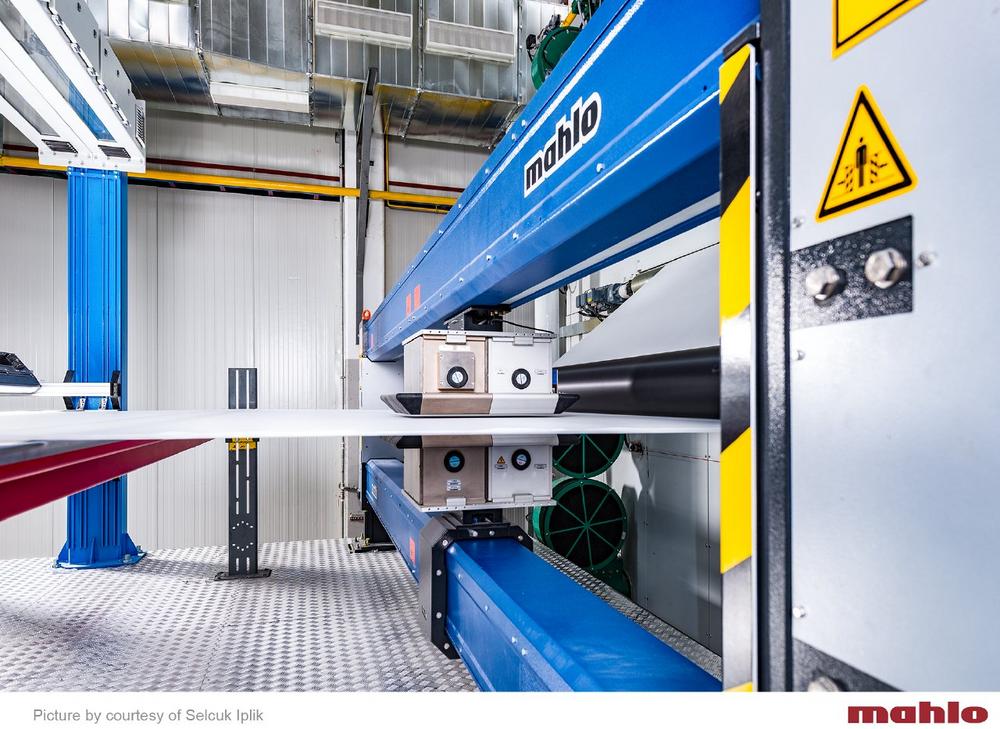“Risks for example are distorted web or variances in the coating application.” Too much or too little product results inevitably in post processing or reject in the worst case. That in turn causes dissatisfaction with the customers and additional costs. The producers counter that successfully by counting on process and quality control – and killing two birds with one stone. They not only get high-quality goods but also save energy and material cost with the ‘right first time’ principle.
“Prerequisite for a working product is – independent of further treatment – straight web”, Kehry explains. At Mahlo, the Orthopac RVMC-15 makes sure of that. The renowned automatic weft straightener detects and straightens 97% of all known web. For s-shaped distortions and non-detectable fabric, the machine builder counts of pin wheel straighteners. “They work only for non-elastic products, however.” This is different with the Orthomax RFMB-15, a fusion of pin wheel and roller straightener. Thanks to combining both technologies, the system minimizes distortions in web as well as elastic knitting.
Quality control: quantity matters
With straight goods, the foundation for a high-performance product is built. “The next step is monitoring the further processing, for example the coating material for coated fabrics.” With the help of scanners and sensors, the Mahlo quality control system Qualiscan QMS-12 makes important parameters visible and therefore controllable. “The basis weight has much significance in knowing if the composition of the single layers is right”, so Kehry. By measuring before and after the coating, one can determine the weight of the single layers. The producer then knows if too much or too little material is used. If the amount is too low, the functionality is affected; is it too high, additional costs are caused. There are several possibilities to detect the basis weight. With a transmission system using beta sensors, the intensity of beta rays is weakened according to the mass of the penetrated layer. This weakening allows determining the basis weight of nearly all materials. As an alternative to that, Mahlo uses sensors with y-ray. Here too, the intensity of X-rays is weakened according to the mass of the penetrated layer.
Coating thickness as important parameter
Another crucial parameter that helps to control the quality of technical textiles is coating thickness. In addition to beta and x-ray sensors, Mahlo works with laser triangulation. A laser beam is projected on the measurement object and reflected. Analyzing the positions of the light beams and the distance from laser to receiver, one can calculate the coating thickness. “There are, however, situations where the laser triangulation reaches its limit. For example, if the material surface is structured or very rough.” For these cases, Mahlo has developed a special sensor that acts mostly independent from the surface. A combination of eddy current sensor and shading sensor makes the measurement insensitive against material surface, color, transparency, opacity and temperature variations.
Company founder Dr. Heinz Mahlo already knew “what you can’t measure, you can’t manage”. For high-performance technical textiles with their various tasks it is crucial to be informed about latest measuring values so that you can intervene if needed. “The result is a cost efficient and simultaneously high-quality product that satisfies producers and customers.”
Those two parties play also an important role in the contemporary topic Industry 4.0 (or Internet of Things). By a simplified and direct data exchange, the end user can keep track at any time where and especially how its product is fabricated. With that, not only a trouble-free value chain is guaranteed. The end user can also be absolutely sure that its fabric is always produced with the right parameters. It is a good feeling to know that the tire cord and the airbag in one’s car or the roofing in the football stadium have most likely been manufactured with Mahlo-technology.
Mahlo GmbH + Co. KG belongs to the worldwide leading manufacturers of measuring, control and automation systems for the textile and finishing industry as well as the coating, film and paper sector. Mahlo is located in Saal on the Danube in lower Bavaria but operates worldwide: Six branch offices in Italy, Belgium, Spain, Brazil, China and the U.S. serve as support stations for the key markets. Numerous international agencies and service stations offer customer support throughout the whole world.
Mahlo GmbH + Co. KG
Donaustr. 12
93342 Saal/Donau
Telefon: +49 (9441) 601-0
Telefax: +49 (9441) 601-102
http://www.mahlo.com
Marketing & Media Relations / Marketing und Öffentlichkeitsarbeit
Telefon: +49 (9441) 601-115
E-Mail: stephanie.marchsreiter@mahlo.com
